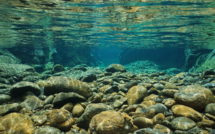

This is part of our special feature on Water in Europe and the World.
A Business Perspective.
At Nestlé Waters, we believe that accessibility to water is a basic human right. Everyone on Earth should have clean water to meet their hydration and basic hygiene needs. Today, there are approximately 4 billion people living in regions where the water supply is woefully inadequate. With about 663 million people without safe drinking water, scarcity has become a very real and complex challenge. Additionally, UNESCO estimates that by 2025, 1.8 billion people will be living in countries or regions with severe water scarcity, and two-thirds of the world population could fall under “water stress” conditions[1] from increased demand and the impacts of climate change.
Urban areas in particular face the highest levels of near-crisis water supply conditions. Nearly 200 cities across the world have reported risks of water stress and scarcity according to CDP Water’s research. The non-governmental organization (NGO) also noted that 132 cities are at risk of declining water quality, while 103 face serious risk of flooding.[2]
Other research points to significant water shortages and difficulties. According to a 2016 World Bank report, water shortage on a regional and national scale is accelerating at an alarming rate.[3] Consider the following findings:
- Exacerbated by climate change, water scarcity could cost some regions as much as 6 percent of their GDP sparking potential conflict.
- The combined effect of increasing populations, expanding cities and rising incomes will dramatically raise water demand, at a time when supply becomes ever more inconsistent and uncertain.
- In the absence of proactive action, water will quickly become scarce in regions where it is currently abundant, such as Central Africa and East Asia.
- Conversely, water scarcity will worsen widely where it is already in short supply, such as the Middle East and Africa’s Sahel region.
Complicating matters further, the World Health Organization estimates that today almost 800 million people are undernourished, while nearly 2 billion are overweight, and, by 2050, the world will have to feed nearly 10 billion people, according to the United Nations.[4] Obviously, water plays a major role in developed and emerging economies to ensure adequate agricultural production to meet global demands.
Stewardship and Collective Action
At Nestlé, we have explicitly incorporated the recognition of and respect for the human right to water into our Nestlé Guidelines on the Human Right to Water and Sanitation.
More broadly, the private sector is an important stakeholder in solving water related challenges through collective action programs with the public sector, non-governmental organizations (NGOs), and civil society. With determination, resolve, and creative strategies, together we can make a meaningful contribution toward implementing solutions to these challenges. Specifically, our company aims to help make progress toward the UN’s Sustainable Development Goal 6 (SDG 6), universal access to safe drinking water, sanitation, and hygiene.[5]
Our business and social obligations boil down to four essential elements:
- Full commitment to the long-term social, economic and environmental sustainability within the areas where we bottle water.
- Respect and support for balanced regulation over withdrawing water, including equitable rules on the costs all water users should pay.
- Bottled water as a convenient, healthy, calorie-free form of hydration, which does not compete with or replace tap water as a major source of drinking water.
- Bottled water as a superior environmental choice over other packaged beverages.
With these four principles in mind, Nestlé Waters has embarked on a mission to help communities survive—and thrive. Our mission comprises two critical components: stewardship and collective action.
Stewardship
Water stewardship promotes socially, economically, and environmentally beneficial water use for all. That is why it is absolutely essential and imperative for our business, our customers—and the world at large—that we commit to caring for water and managing water resources for future generations. We believe meaningful, transparent collaboration with the local communities in which our plants are located is the most effective way to care for shared water resources sustainably and responsibly.
Nestlé Waters recognizes that the long-term success of our company is built on water stewardship in the watersheds where our factories are located and where suppliers and consumers live. Effective stewardship strategies are implemented through collective action programs which ensure the human right to water while ensuring that ecosystems function appropriately.
While we believe that governments should take the lead in establishing broad, forward-looking, intelligent water policies within which we and other water users can operate, we understand the responsibility private industry faces. Nestlé Waters contributes to the policy process, and we are committed to growing our business in a manner that facilitates effective water stewardship in every geography where we source and operate.
At the same time, we are committed to helping develop cost-effective, relevant water stewardship measures within watersheds globally. As part of our commitment, Nestlé participates in the 2030 Development Agenda and Sustainable Development Goals, geared to “reframe sustainable development and corporate sustainability and touch the lives of people everywhere.”
Nestlé Waters is committing to water stewardship as part of the Sustainable Development Goals in the following three ways.
- Stewardship—We have pioneered the Alliance for Water Stewardship (AWS), a global organization comprising of members from leading businesses, non-governmental organizations, public sector agencies and academic institutions with the collective goal of promoting responsible use of freshwater geared toward worldwide economic and environmental benefits.
- Collective Actions—We listen and work together with our local stakeholders to address the most critical shared water challenges.
- Transparency—We make our water knowledge publicly available in an effort to build mutual understanding of the local water context.
We are particularly proud of our role in supporting the AWS and committing to its certification and standards. The AWS Standard measures responsible water stewardship across social, environmental, and economic criteria. These factors span geographical and socioeconomic lines, including:
- The effect on disadvantaged communities with difficulties accessing water.
- Environmental quality at water-related locations, such as marshes.
- Water management, particularly if it provides a positive economic benefit.
Adopting the AWS Standard involves accepting four key principles:
- Good Water Governance—Effective and responsible management of water resources.
- Sustainable Water Balance—Managing water use to ensure that the rate and quantity of water withdrawal does not outpace the natural replenishment of the source.
- Good Water Quality—Taking steps to preserve—and, when possible, improve—the quality of available water resources.
- Healthy Status of Important Water-Related Areas—Identifying and protecting areas of the watershed that are critical to the health and sustainability of local water resources.
Action
At Nestlé Waters, commitment is followed by action. For many years, we have initiated collective water measures that address water quantity, quality, and availability. Our goal is to share our local water knowledge and expertise, by proactively engaging with the very communities who have relied on the same water resources for decades—in some cases, centuries. Together, we develop and implement collective actions to address local water complexities.
Nestlé Waters is involved in a number of other proactive initiatives around the globe:
- Agrivair—In the French administrative division of Vittel, this project is designed to preserve the quality of the area’s local water resources. Agrivair provides local farmers with support and advice—technical and financial—to develop sustainable agricultural practices, including the phasing out of pesticides. To date, we’ve implemented Agrivair on more than 10,000 hectares of land, which has helped improve local water quality, and has in turn resulted in many biodiversity initiatives.
- California Water Action Collaborative (CWAC) – Cofounded by Nestlé Waters North America, the CWAC was established to improve water security across the country’s largest state. We are currently involved in a number of large-scale restoration projects to increase water supplies in California. We are particularly proud of our involvement with CWAC as a means to improve California’s water security for people, business, agriculture and nature. Our work with CWAC revolves around three crucial areas:
Returning water to the system.
Building social capital to create greater trust across sectors.
Driving corporate water stewardship to align with the California Water Action Plan.
- ECO-Broye programme—Based in Switzerland, the ECO-Broye programme is aimed toward preserving natural resources and sustaining economic development around the source of our Henniez mineral water brand. Launched in 2009, this holistic, community-based initiative has established more than 2,000 hectares of ecological corridors to protect local biodiversity.
- Project WET—A US-based foundation, Water Education for Teachers (WET) is the leading global organization for water education, publishing learning materials for 25 years. Project WET’s fun, hands-on, interactive approach spreads key messages about water, water resources, water management and water protection among students. Partnering with organizations such as UNESCO, USAID, the World Meteorological Organization and the World Water Council, Project WET reaches millions of children in more than 50 countries across every continent. Nestlé has been the largest private donor to the Project WET Foundation for decades. In the US alone, the program helps train more than 30,000 teachers a year. Project WET reaches more than a dozen countries, including Argentina, China, France, Hungary, Italy, Mexico, Pakistan, South Korea, Thailand, the UK and the US.
With the goal of raising awareness about the significance of water conservation, we initiate many of these collaborative, multinational programs with local Ministries of Education or institutional partners. Working with local authorities, we have helped deliver water education to hundreds of thousands of children.
Going Local
Because Nestlé Waters believes water is a human right, all of our facilities provide clean water and sanitation (WASH) to employees. For example, when we opened a new factory close to Abaji in Nigeria, we built a community water facility offering clean, safe drinking water to more than 1,000 people in the village of Maderegi.
At Nestlé, we are committed to developing thriving and resilient communities such as WASH. By 2020, we will launch collaborative WASH initiatives in every community where we work and where the need is greatest.
More broadly, we are committed to supporting social and economic development in the communities where we live and work. Nestlé Waters listens and engages with communities to address local concerns and expectations and to develop shared economic, social or environmental initiatives. In particular, we ensure that our operations respect the human right to water and sanitation. That is why, in some countries, we provide communities located close to our factories access to clean water at no cost.
We respect and support balanced regulation on the withdrawal of water. This includes equitable rules on the amounts all water users should pay to ensure the long-term sustainable management of local watersheds.
Water is Perhaps the Most Important Natural Resource
As water supplies reach critical levels, we all must continue developing new, strategic approaches to help ensure that we can meet our planet’s hydration and hydrological needs. Consumer demand for bottled water as a daily healthy hydration choice is on the rise. And though bottled water does not compete with tap water as a major source of drinking water, during natural disasters, or when water sources and distribution systems are unavailable, it can play a vital, distinctive role. It also delivers a better environmental performance than other types of packaged beverages. Data reveals that bottled water is a high performer from an environmental perspective—for two chief reasons. Nestlé Waters only uses 2.5 litres of water to produce one litre of product. Compare this to the nearly 300 litres of water required to produce one litre of beer. Second, the carbon footprint of bottled water is half that of carbonated soft drinks and three times less than beer and juice. In both cases, these differences are due to the raw materials required to bottle each beverage.
Without a doubt, water is a critical resource, one which is under stress from increased demand and the impacts of climate change. With more than 97 percent of the world’s water saline, and only 2.5 percent freshwater, the majority of water is locked up in glaciers, ice and snow. Exacerbating these challenges, less than 1 percent of the world’s water is available freshwater in lakes, rivers, underground aquifers, and other sources.
And a vast majority of the world’s water is already under great stress—70 percent of available freshwater is used in agriculture, 20 percent is used in industry and 10 percent is used by households. The challenges can indeed appear daunting at times. Today, 2.1 billion people lack access to safely managed drinking water services, and 4.5 billion people lack safely managed sanitation. What’s more, 842,000 people die every year from diseases caused by unsafe water, inadequate sanitation and hygiene, and 90 percent of all natural disasters are water-related.[6]
The challenge of delivering access to safe drinking water to an ever-increasing global population cannot be solved by any one stakeholder. Organizations must work in partnerships to develop innovative ideas and creative solutions addressing our most pressing water challenges. Private industry working with the public sector, governments, non-governmental organisations and civil society is the only path forward for us to make significant progress toward SDG 6 by 2030. Achieving these goals makes it essential to emphasize ever more water stewardship and collective action initiatives. That is why Nestlé Waters is more committed than ever to continue supplying bottled water responsibly, through sustainably sourced water and products made with recyclable packaging.
At Nestlé, we believe our responsibility and mission to care for water and help act as stewards for water resources for future generations is more consequential than ever. We believe meaningful, transparent collaboration among the many local stakeholders beyond our factories is the most effective way to responsibly and sustainably manage shared water resources. This is how we define true water stewardship—promoting water use that is socially, economically and environmentally beneficial for all.
Fernando Mercé has been the President and CEO of Nestlé Waters North America since 2017.
Photo: Colorful water drop splash | Shutterstock
Published on December 11, 2018.
References:
[1] http://www.unesco.org/new/en/natural-sciences/environment/water/wwap/wwdr/wwdr4-2012/
[2] CDP, 2017
[3] World Bank, 2016
[4] https://www.un.org/development/desa/en/news/population/world-population-prospects-2017.html
[5] https://sustainabledevelopment.un.org/sdg6
[6] https://www.unisdr.org/2015/docs/climatechange/COP21_WeatherDisastersReport_2015_FINAL.pdf




